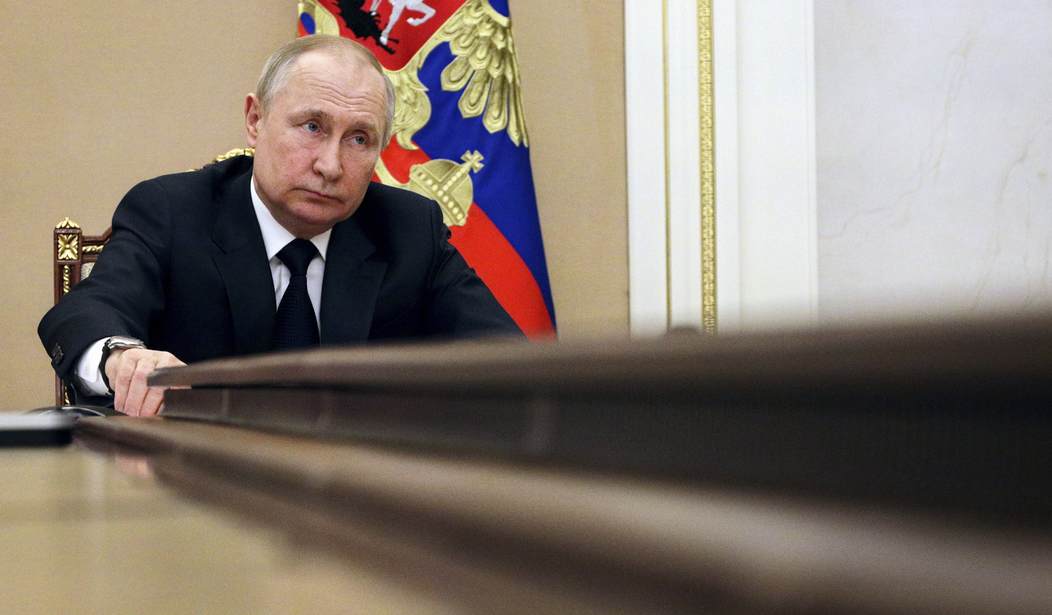Gee, I wonder how this keeps happening? Window failures seem to abound in Russia, especially in proximity to Vladimir Putin’s naysayers. The latest to fall (!) victim to this epidemic is Ravil Maganov, who dropped out of a hospital window in a Moscow suburb:
The chairman of Russian oil and gas giant Lukoil — which spoke out against Russia’s invasion of Ukraine — has died after falling out of a hospital window, state news agencies RIA Novosti and TASS reported Thursday.
Ravil Maganov died at the Central Clinical Hospital west of Moscow, according to the reports, which cite the hospital and law enforcement sources.
“The incident occurred around 07:00 am Moscow time in the Central Clinical Hospital … The man fell out of the sixth-floor window and died as a result of his injuries,” a source told TASS.
NBC News notes that Lukoil execs were particularly unenthusiastic about Putin’s war on Ukraine, and that Maganov isn’t the only unenthusiastic exec to reach room temperature since dissenting. They have also noticed the epidemic of faulty windows plaguing Russians who oppose Putin:
Lukoil is Russia’s second-largest oil producer. It was a rare Russian business to come out against Putin’s war in Ukraine, which the Kremlin insists on calling its “special military operation.”
The company’s board of directors called for an end to the war in early March, within days of the full-scale invasion of Russia’s neighbor. …
Alexander Subbotin, a former Lukoil manager, was found dead in his basement outside Moscow in May, according to Reuters, citing local media.
In November 2021, a Russian diplomat was found dead on the streets of Berlin after falling from an upper floor of the embassy, German outlet Der Spiegel reported, citing security sources.
Investigative journalist Maxim Borodin, who wrote stories about corrupt officials and the Russian military, died in 2018 after falling from his fifth-story balcony, according to the news agency he worked for.
TASS later called it a suicide, although Lukas Oil offered their condolences on a death caused by a “serious illness”:
Maganov, 67, committed suicide, state-run agency TASS reported citing unnamed law enforcement sources.
“He was [getting treated] in the hospital after a heart attack. In addition, he was taking antidepressants,” TASS reported Thursday.
Lukoil later confirmed his death but said Maganov “passed away after a serious illness.”
A suicide, eh? That may well be true, but it’s part of a pattern of, um, convenient deaths for Putin and his regime, especially in its energy sector. The BBC gives a brief and recent summary:
Several Russian energy oligarchs have died in unusual circumstances in recent months:
- The body of millionaire Novatek former manager Sergei Protosenya was found alongside his wife and daughter at a Spanish villa in April
- A former vice-president of Gazprombank, Vladislav Avayev, was found dead with his wife and daughter in their Moscow flat, also in April
- In May, a former Lukoil tycoon Alexander Subbotin died of heart failure, reportedly after seeking alternative treatment from a shaman.
Lukoil is Russia’s biggest private company. In its statement it said it was down to Maganov’s managerial talent that it had evolved into one of the world’s largest energy firms.
Putin’s either trying to keep a lid on dissent, or he’s had an extraordinary series of lucky events that have any potential political threats dying on their own. Even that will only take Putin so far, though. As the Chicago Tribune’s editorial board warns, the massive number of missing Russian sons will add up to a critical conflict for Putin, in addition to the increasingly obvious attempts to kill anyone who openly opposes him:
Putin has eluded massive blowback from everyday Russians principally because his Kremlin controls all levers of media. The version of the war in Ukraine that Russians get is the version Putin shapes, or more precisely, fabricates. Anyone or any entity that dares to swim against the tide risks the Kremlin’s wrath.
Demonstrations in Russia against the war have waned only because Russians have already seen the Kremlin’s terrifying response to anti-war protests. Shortly after Russian troops invaded Ukraine in late February, large-scale demonstrations broke out in Moscow and other cities — and were brutally put down. Legions of Russians were arrested. Many younger Russians who oppose the war have fled the country.
Putin’s crackdown on dissent reflects arguably his biggest fear — his vulnerability to forces from within. …
What’s sure to move Russians to question their president’s actions in Ukraine is the truth about the fate of loved ones on the battlefield. Thomas-Greenfield acknowledged that even the U.S. doesn’t have a clear picture of the number of dead and injured Russian soldiers. But in the invasion’s early weeks, hints of the toll on Russian battalions came with images of Ukrainian soldiers moving untold numbers of dead Russian troops off of streets and onto roadsides.
“When their soldiers don’t come home,” Thomas-Greenfield said, “families are going to start asking questions.”
Maybe they already are — and maybe that’s why Putin’s taking out oligarchs now, pour encourager les autres. But that strategy will eventually produce a defensive response from the oligarchs, especially if the Ukrainians begin pushing the Russians out of Crimea and the Donbas. At that point, the epidemic of window failures may well claim Putin as its final victim.








Join the conversation as a VIP Member